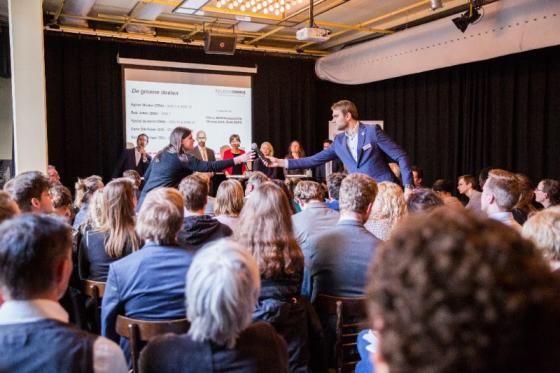Achieving political commitment to the sustainable delivery of WASH services is generally not the problem. It is making governments realise that this is much more than providing a water pump. Do you want to hold your government accountable? Have them 'Adopt an SDG'!
Published on: 17/04/2018

In August 2015, the then Secretary-General of the United Nations Ban Ki-Moon proudly presented the Sustainable Development Goals (SDGs). In his words, an ambitious agenda to end poverty in all its forms through 17 different goals and 169 set targets. In contrast to what most people assume, the challenge is not in the ambition of getting commitment from governments for universal access to safe drinking water, sanitation and hygiene (WASH). Its importance is widely acknowledged. For example: the WASH Strategy 2016-2030, a long term strategy developed by the Ministry of Foreign Affairs of the Netherlands to provide 30 million people with 'sustainable access to safe water and 50 million people with sustainable access to improved sanitation'. In fact, which government does not want to provide safe drinking water, sanitation and hygiene (WASH)?
The real challenge is to get commitment from governments to engage with the complex – and sometimes messy – process of building the systems that are needed to deliver WASH services. But what are those WASH services or complex systems? Well, in order to enable for example safe drinking water it is not just about the provision of a water pump or a tap. You need to think of a much bigger and complex system: not especially, who is building the pump or tap, but who is maintaining it? Who is designing the corresponding pipe system? Who is educating children on the risks of polluted water? What is the role of other organisations and government institutions? Will governments on a local or national level take the lead into the the delivery of WASH services? As you see, guaranteeing safe and especially sustainable access to water is much more than opening a water tap. It is a complex system where all the different stakeholders are different pieces of the puzzle: Civil Society Organisations (CSOs), Non-Governmental Organisations (NGOs), the local government, national government and the private sector.
Although it is difficult to keep all the different stakeholders, such as NGOs and local or national government, on the same page, it is possible. This could be done for example by organising innovative meetings, such as the 'Adopt an SDG' initiative hosted by Partos, an overarching NGO platform in the Netherlands. In the summer of 2017, Partos realised that there was not sufficient political commitment to the Sustainable Development Goals. Therefore, they started the initiative where different Members of the Dutch parliament adopted one of the 17 Goals. Not only are they the political focal point for those CSOs or NGOs involved, but they also provide an opportunity to strengthen political accountability. During one of the meetings last month, each Member of Parliament discussed their achievements on the specific Goal and was provided with feedback by the NGOs and CSOs attending. Although everyone wants to commit to WASH, by 2050, 40 percent of the global population is still expected to live in areas facing severe water stress. If we want to achieve sustainable access to WASH you need champions who really take this commitment a step further by proposing concrete measures in parliament.
In other words, if you want to your government to commit to the complex – and, yes, sometimes messy – service delivery of WASH, or another Sustainable Development Goal. Have them adopt an SDG!
At IRC we have strong opinions and we value honest and frank discussion, so you won't be surprised to hear that not all the opinions on this site represent our official policy.